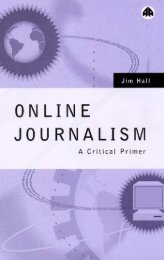Modul Mata Kuliah Journalisme Online - Ayo Menulis FISIP UAJY
Modul Mata Kuliah Journalisme Online - Ayo Menulis FISIP UAJY
Modul Mata Kuliah Journalisme Online - Ayo Menulis FISIP UAJY
Create successful ePaper yourself
Turn your PDF publications into a flip-book with our unique Google optimized e-Paper software.
Linking is at the core of the Web experience, tying together content that allows readers to discover<br />
unexpected treasures and contextual information that can't comfortably fit into print and broadcast<br />
paradigms. But linking also comes with challenges for media organizations. Until now, content was easily<br />
classified -- it was in the paper or it wasn't; it was broadcast on the air or it wasn't. Linking has created a<br />
netherworld in which media companies can point to sites without assuming responsibility for their<br />
veracity or standards. It has also provided media sites with ways to expose their readers to content that<br />
falls outside of their own standards -- such as with the Nick Berg beheading and the Muslim cartoons run<br />
by Jyllands-Posten -- while still claiming that they didn't "run" the content themselves. So how do media<br />
sites embrace linking without compromising their core values?<br />
Principles & Values<br />
A link to an external site does not signify an endorsement of that site or its point of view. It is<br />
merely a signal to the reader that there may be content of interest on the destination site.<br />
Despite this, media sites should make it clear to their readers -- in the user agreement, site<br />
guidelines or via some other method -- that there's a difference in standards between the<br />
content that resides on their own site and the content they link to.<br />
Because of the spider-like nature of the Web, media sites can't be expected to apply even these<br />
relaxed standards to the content of sites that are linked to from sites we link to (the two-click<br />
rule).<br />
When readers put their own links to content in message boards, blog posts, etc., those links<br />
should be considered user-generated content and subject to the same controls.<br />
We encourage all media sites to link to external sites. Linking off-site is an extension of your<br />
site's user experience and fosters a feeling of openness that's conducive to repeat visits. Trying<br />
to keep readers within just your site is a losing proposition.<br />
When linking, sites should not be forced into including links that support all sides of an issue.<br />
While news articles themselves should adhere to the traditional standards of fairness and<br />
accuracy, assuring balance in links run counters to the concept of providing only useful links to<br />
the reader.<br />
Protocols<br />
When deciding whether to links to other parts of your own site, ask yourself the following questions:<br />
o Is this content being linked to relevant to someone who would be reading/viewing this content?<br />
When choosing whether to include a link to another site, ask yourself the following questions:<br />
o Is the linked content relevant for someone who would be reading/viewing this content?<br />
o Does the content being linked include content that could potentially fall within the realm of libel<br />
or slander?<br />
o If the content being linked to falls outside the standards of your site, should you include<br />
notification of that fact (i.e., notify users of profanity, nudity, etc.)?<br />
Questions & Answers
















